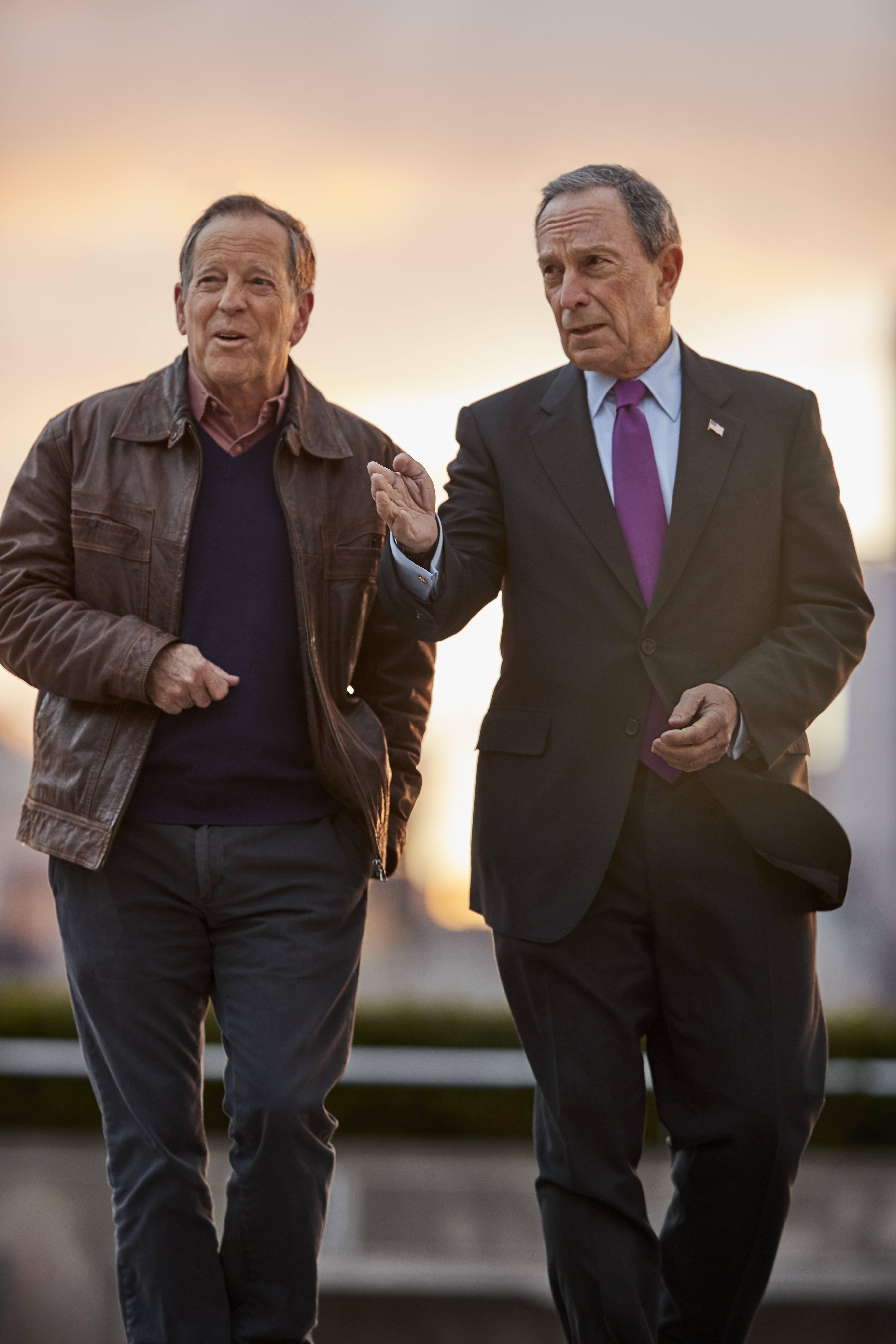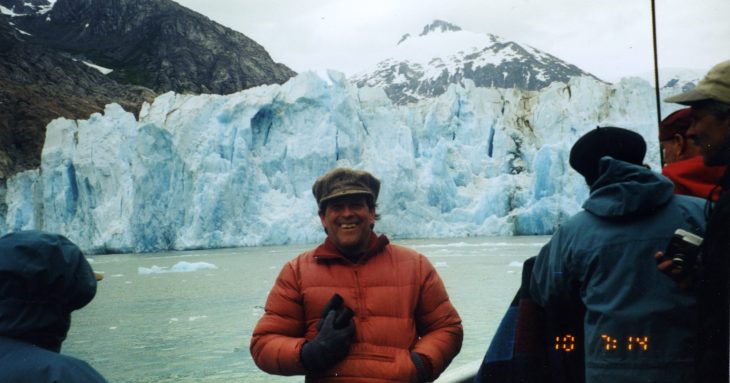Billionaire businessman and philanthropist Michael Bloomberg recently pledged to rapidly spend $500 million in a bid to push the U.S. “Beyond Carbon,” aiming to end this country’s use of coal and natural gas power in a generation or less.
In another recent piece, I featured an in-depth interview with Carl Pope, the veteran environmental leader who has essentially been the inspirational force behind Bloomberg’s evolution. The former New York City Mayor had never given a major gift to environmental causes as of a decade or so ago, until Pope “convinced” him to get involved.

My previous piece was an attempt to understand the ethical vision influencing Bloomberg’s work, by looking at Pope’s personal story and the history of the environmental movement he has helped to shape. Below, Pope joins me again to look at the details of Bloomberg’s “Beyond Carbon” plan, including how he was able to persuade Bloomberg to take it on, and some areas of controversy that could arise as the $500 million is distributed.
Greg Epstein: You and Michael Bloomberg met around a decade ago or so, right?
Carl Pope: About 12 years ago, actually. 2007.
Epstein: Bloomberg had never given a major gift to an environmental group before he met you, and, as he writes in the book, you “convinced him” to get massively involved, to the tune now of many hundreds of millions of dollars. What do you think it is about you, the way that you approach things, or the work you do that made the two of you, in this relatively unlikely partnership, work so well?
Pope: We both like big ideas, and we both like to pursue them very pragmatically. We set very high expectations for what we want to get, and we’re willing to take necessarily small steps to get there. That’s one thing.
The second thing is, my original environmental frame was air pollution, [which] I worked on the first seven or eight years I was an environmentalist. Mike is a big public health advocate. So the fact that I was talking about saving people’s lives made a lot of sense to him.
Epstein: He talked about how you ‘showed him the numbers,’ back in 2011, on just how deadly coal actually is.
Pope: Yeah, that was the deal sealer.
Epstein: Interpersonally, what the interactions between you and him like?
Pope: We’re both public figures who are actually somewhat introspective, and so it works.
Epstein: I’ve read the “Beyond Carbon” plans as they’re presented by the Bloomberg organization. They do seem quite promising as far as broad, sweeping PR statements go.
But whether or not they will work is all in the details, right? You’re a detail-oriented person, as you just mentioned, so, what are some of the practical steps the plan calls for that you think deserve the most attention, beyond the headlines?
Pope: In A Climate of Hope, Mike and I articulated an approach to climate in which we gave our reasons for thinking that most climate leadership is going to come not from national governments but from businesses, cities, provinces, civic organizations, from the bottom up.
Those groups are going to be motivated and attracted to climate solutions which not only solve the climate problem, but are good for the economy, improve public health, and make people safer. There are a lot of solutions. And these [grassroots] actors have the tools to implement them.
That was a premise when we wrote the book and published it in 2017. Now it’s a reality. It’s happening. But there are a lot of obstacles and barriers.
Some of them are simply institutional. New Mexico, for example, has just passed a very ambitious set of climate objectives.
New Mexico is quite small, relative to a state like California. It doesn’t necessarily have the capacity to write all the regulations that it needs to carry out its goals.
It was very important, if you were trying to get cities to be able to buy electric vehicles, that you assemble a large consortium of cities that will do it together, because then they’ll get a much better price on their electric vehicles, and they’ll get much better vehicles.
Somebody had to put that consortium together. There are a bunch of investment needs that are required to accelerate this bottom-up climate progress.

Image via Getty Images / RomoloTavani
And the purpose of Beyond Carbon is invest a meaningful sum of money — we think $500,000,000 over three years is a meaningful sum of money — to identify those barriers and say, “Where can we make progress between now and the presidential election?”
The gap we’re trying to figure here is that by the time of the presidential election, we increase and accelerate America’s climate momentum. And that we move these climate solutions forward in more places, faster, and deeper.
And that may mean having more states pass renewable energy standards. It may mean helping companies that want to go to all-electric, zero-emission fleets find each other and put together purchasing consortiums.
It may mean helping a group of builders and a group of bankers sit down and figure out how we can make sure that when you go to buy a new house, if that house is super efficient and electrified and doesn’t bring a utility bill with it, that you actually get credit from that from the bank that’s writing your mortgage.
It may mean going to help, in some states, public utility commissions are elected. And we may go in and help candidates who have a progressive vision for where that state can go on clean energy, the way I see it on the public service commission of Mississippi.
Epstein: That is a lot of money, and a broad vision. How are you evaluating where to spend it all? I mean, it seems like some of the checks are already being written, or they will be soon. So what does the team look like that’s making these decisions, and what’s their process?
Pope: It’s still evolving. But, if you look at the package, we’ve got a couple of things that are very high priorities for us that are already pretty much geared up, and where the people who are going to do the work were already doing it, but not as much of it or as fast as we would like. [The idea is to] increase the volume of renewable power so that, as we retire all of the coal fleet by 2030, we replace it with wind and solar rather than replacing it with new natural gas plants.
We’re still going to have natural gas plants in three years, or even in 2030. But we don’t want to be building new natural gas plants because, shortly, we’re going to have to start retiring them.
Those decisions will probably be relying, primarily, on organizations we’ve already been working with on the Beyond Coal campaign, like the Sierra Club, but others. In addition, as I mentioned, we’ll be looking at the states where public utility commissions are directly elected and we’ll be saying, “Are there two or three of those states where, right now, the public utilities commission is not very progressive and is not being helpful and encouraging renewables?” And where we might want to get involved in some of those elections.
But, yes, we do have to make a kind of intimidating series of priority decisions in the next couple months, and we have a small team to do so, but we’re also working with a lot of other organizations. There’s a very large climate movement already out there, which we’ll be looking to tap into their expertise and have them help direct us in the places where they think there’s a real opportunity to accelerate climate progress. And those conversations have already begun.

Image via Getty Images / Abscent84
Epstein: You mentioned natural gas in those last comments, and this is definitely something that I felt it was important to address, particularly in an interview series that’s focused on ethics. You’ve approached a number of things in your career very pragmatically, as you say.
And it seemed to me, as I was researching your work, that issues around natural gas have probably been the biggest professional controversy that you’ve been involved with. Would you say that’s fair to say?
Pope: I think that’s factually correct in the sense that they have generated the greatest controversy. I don’t think those were actually the things that I would say were the most disputable that I’ve done, but they’re the ones that have attracted the most attention, you’re right.
Epstein: The attention-grabbing aspect of it, I think, is the decision by the Sierra Club during your tenure of leadership to accept very large sums of money, tens of millions of dollars from natural gas interests, in particular, the Chesapeake Energy Company. And it does seem there’s been an evolution on natural gas, both by you and by Michael Bloomberg.
When he refers to the time you met, and your conversations about coal, his description doesn’t even seem to put natural gas on the radar for either of you in your conversations at that stage. And even in the book, in that same chapter where he talks about you persuading him to take these dramatic actions he talks rather neutrally, or even positively, about some aspects of natural gas, even fracking, which he says just needs to be done “safely,” which many environmentalists would say is an oxymoron.
How would you describe the evolution of your thinking, and Michael Bloomberg’s thinking on natural gas, even in the last couple of years? Is there any degree to which you feel that you were wrong, or he was wrong, earlier — is this is a correction of mistakes?
Pope: We did not foresee the future perfectly. So you can say we were wrong about the future because neither Mike nor I, in 2010, saw a world in which last week the state of California entered into a solar energy width storage contract for less than two cents a kilowatt-hour.
It is the cheapest electricity and storage ever offered in the United States. And Mike and I did not anticipate that as soon as 2019, we simply would have no need for additional fossil fuel capacity, that we would be ready to make the transition completely and rapidly so that by 2030 we should be able to get rid of probably 90% of our fossil fuel fire capacities. I mean, we really can get to a 90% clean energy grid by 2030, nationally.
We did not anticipate that, and that’s good news. The fact that we didn’t get it right means that the world has moved in a positive direction, faster than even two pretty optimistic guys could anticipate. So in that sense, we were wrong.
In another sense, however, you have to realize that when I was working with Chesapeake Energy, the issue on the table was building a 150 new coal-fired power plants. And at that point, nobody was building new gas-fired power plants.
The threat at that moment was coal, and I made the decision to fight the threat that we had to stop on that day. The threat that was happening every month in 2007 and 2008 was new coal-fired power plants were going into permitting processes.
I understand the criticism of people who criticize me. On the other hand, I would say, speaking personally, I would rather live in a world in which the Sierra Club took that money and those 150 coal-fired power plants got stopped, which they did, thanks to the money, than in a world in which the Sierra Club declined that money and we were now faced not only with trying to shut down a bunch of old, out-moded coal-fired power plants, but with shutting down 150 brand-new ones.
So, I think the world is better off for the decision I made, which doesn’t mean that I had perfect foresight at the time. Obviously, we weren’t going to need gas, and I didn’t have to talk about needing gas, because, in fact, we weren’t going to need it. I didn’t anticipate that. But the big thing that’s changed is we don’t need gas.

Epstein: Well, I hope you’re right about what you were right and wrong about.
About the plan: especially in light of the current failures to act on the part of too many politicians, etc. and the fact that you are moving forward without buy-in from national politicians, I feel grateful for the work you’re doing. But one piece I found off-putting in the plans that have been put out there — and it’s possible I’m quibbling here — was the repeated emphasis on the idea of Michael Bloomberg personally as, “the world’s leading environmentalist,” And he may be, at least by financial measures.
But talking about things this way just seems to represent a kind of commercialized take on environmentalism, where everything’s a competition and ego and name and winning matters more than including others and their names and their work; where the biggest winners in capitalism have to be the biggest winners in do-gooding as well.
Was that language written when Michael Bloomberg was considering a run for president? And how constructive do you find it, to speak about things in those terms?
Pope: I wasn’t involved in drafting or reviewing that language, so I can’t tell you when it emerged or exactly where it came from. And I frankly I don’t think it’s essentially helpful or harmful. I think it’s neither here nor there.
Where I think the rubber really is going to meet the road for us, and this is a hard issue, although it isn’t the question you asked, is the experience that the Bloomberg Organization has had in doing this kind of thing before is in gun control, where they helped to create Everytown, which is a massive grassroots gun safety organization.
When they did that, there was a lot of support for gun safety, but there wasn’t really a grassroots organized gun safety movement. So they were putting resources into what you can call a blue ocean. There weren’t a lot of people already there, doing what they were trying to encourage people to do.
Obviously, in the case of climate, it’s very different. You’ve got a much larger and more complicated climate movement already in place, doing great work.
And the challenge is, how do you really infuse an issue which already has a strong, but a very competitive movement? The climate movement is very competitive with itself. I used to run one of those organizations. I can tell you that.
So how do you infuse money in so that you avoid two pitfalls and hit the sweet spot? Pitfall one is you just solidify all of the priority mistakes that already exist.
There are things that are getting too much money spent and things that are getting too little money spent. You don’t want to reinforce that with your money. You want to end up with a funding priorities system that is more strategic and more effective.
On the other hand, you don’t want to create the feeling that you’re pushing everybody else out and making decisions for them. So, how to be a change agent, but collaborative, is hard. That’s really where the challenge is, not what words we use to announce it.
Epstein: How are you viewing this, in terms of the different aspects of collaboration? What about work with environmentalists of color, in particular, and, even more specifically, maybe Black environmentalists?
You know, a lot of the plans you’ve presented and the things that you articulate in Climate of Hope seem, for example, to be very resonant with Van Jones’ work from a decade ago on the Green Collar Economy, or Majora Carter, a MacArthur “genius” fellow who co-founded Green for All with Van Jones and, like you and Mr. Bloomberg, has been described as a very pragmatic leader on climate issues.
Overall, this seems like it could be a thorny issue, because the Black community has been excluded by certain environmental efforts in the past. What will your approach be?
Pope: I think I can safely say that when the funding of this effort is wrapped up, you will see a much more diverse climate movement having been funded by Beyond Carbon than has been historically funded by climate philanthropy. I will be really shocked and very disappointed if we don’t significantly enhance African American climate advocates, immigrant climate advocates, blue-collar organizations, communities of faith, youth.
I would expect to see a lot of the… not so much the conventional environmental arm of the climate movement, but the full diversity of the climate movement be engaged in the programs that we’re going to be funding.
Those meetings have been among the first meetings we’ve had, so we’re actually already walking the walk.

Image via Getty Images / SaulHerrera
Epstein: Any reaction to Governor Inslee presenting himself as the climate change candidate, or any of the other presidential candidates that you feel are worth commenting on?
Pope: At Salon.com, you will find a blog I wrote last week about the platforms that have already been injected into the Democratic primary process by the candidates, led by Governor Inslee, but not Governor Inslee exclusively, and what those plans tell us about the future of climate advocacy in the United States, which I think is mostly very positive.
I think it’s terrific that Jay is running as a single-issue candidate. Historically, the last single-issue candidate to win a major party nomination was George McGovern, who won as the anti-war candidate. That’s the pathway Jay’s trying to tread and the Democratic voters will decide whether that’s what they want.
On the other hand, what’s striking is, and I think Jay’s presence in the race has been helpful in this, that you have candidates like Beto O’Rourke, who is yet to have a particular climate history, coming out very early with very ambitious climate plans. And I think the Green New Deal has helped to shape the new conversation. So, in one sense, I think the Green New Deal has already won.
Epstein: A last question I ask this at the end of all of my interviews: how optimistic are you about our shared human future?
Pope: I’m optimistic because I find the alternative intolerable. I have to get up every morning. I think, if you’d asked me a month ago, I would’ve been less optimistic, because at that point it really did look like the broad center of global politics was falling apart. But since that time, we’ve had elections in Europe and Turkey, both of which showed that the center can hold when the center offers real solutions that include everybody.
The grim fact is, we cannot duplicate the 20th century, which was a period in which it was actually possible for nationalistic politics to work. I mean, it didn’t work all that well. But at least you could look at the country and say, “You can have a status quo government, and a status quo government can work.”
Status quo governments can’t work in the 21st century. And actually, one of the reasons I wanted to work for Mike Bloomberg is because Mike, particularly, envisioned that this wasn’t going to come from nation-states. The nation-states, their century has been. This is going to be the century of local entities.
So I think we do have the opportunity to have a really quite amazing human future. If we can get the nationalism of the 20th century out of the way. Donald Trump would not agree.
